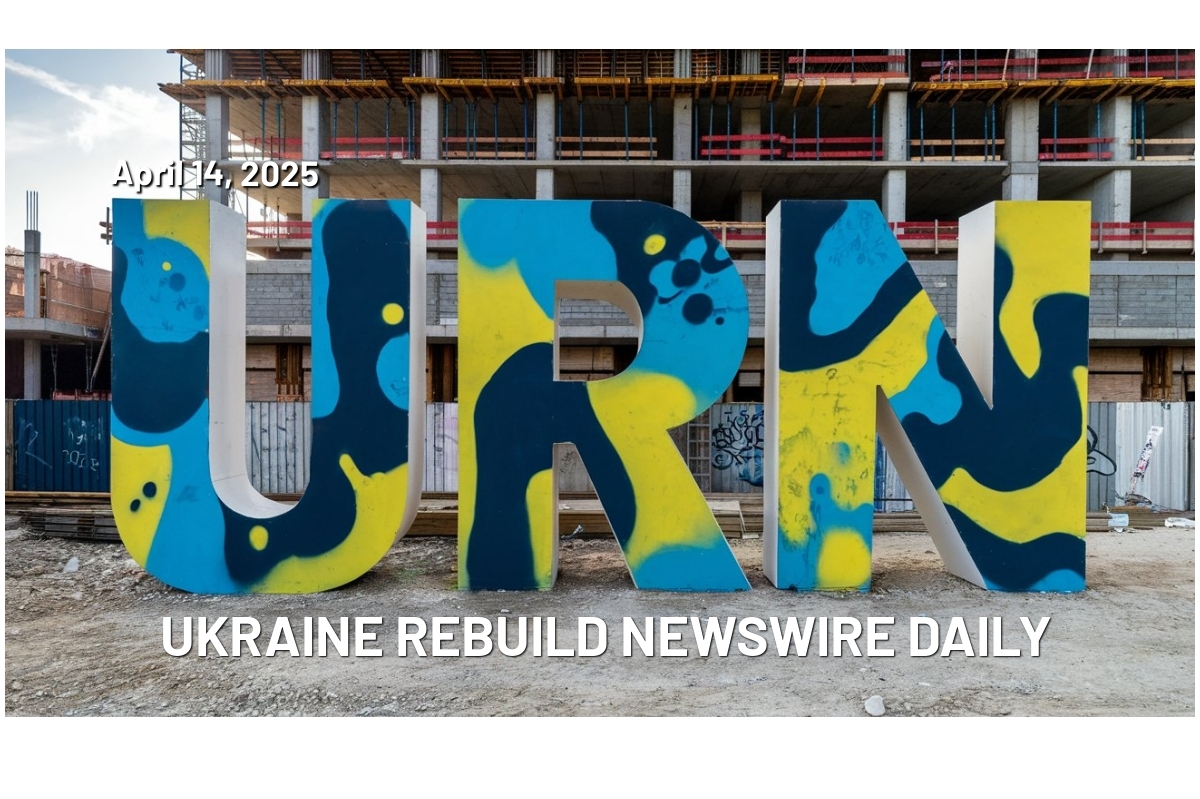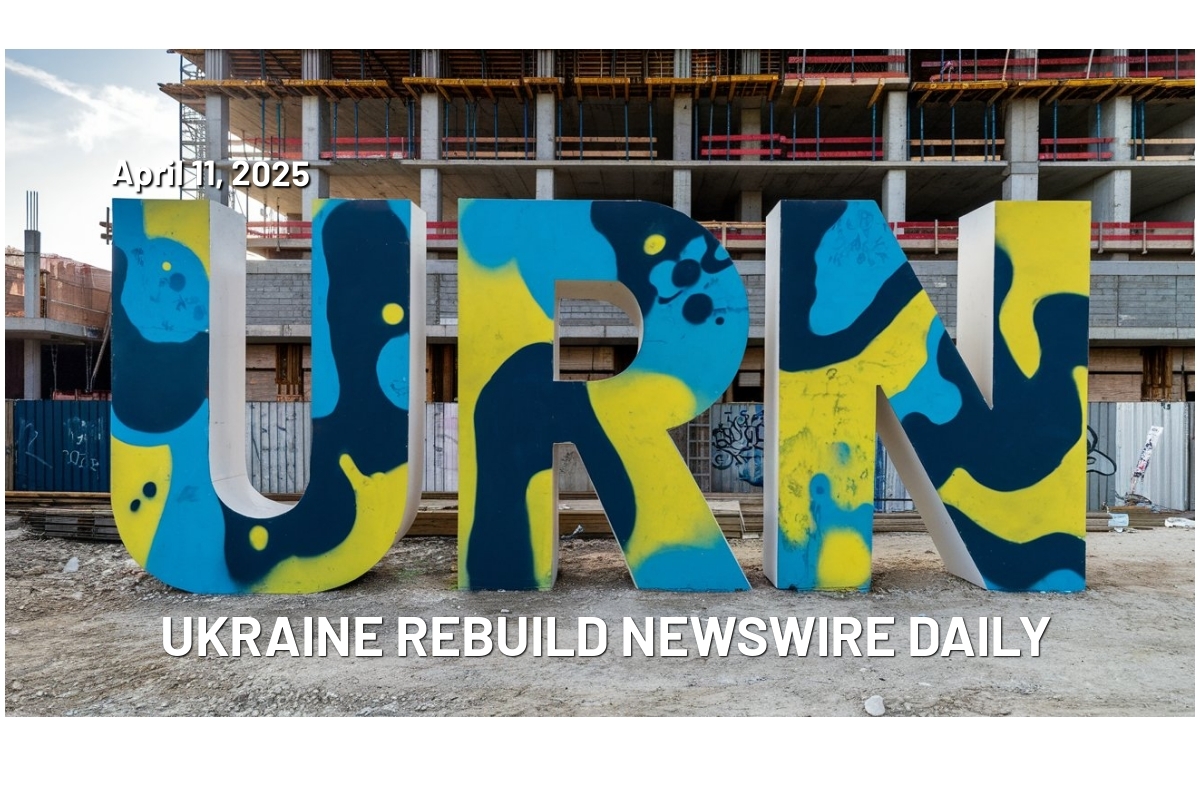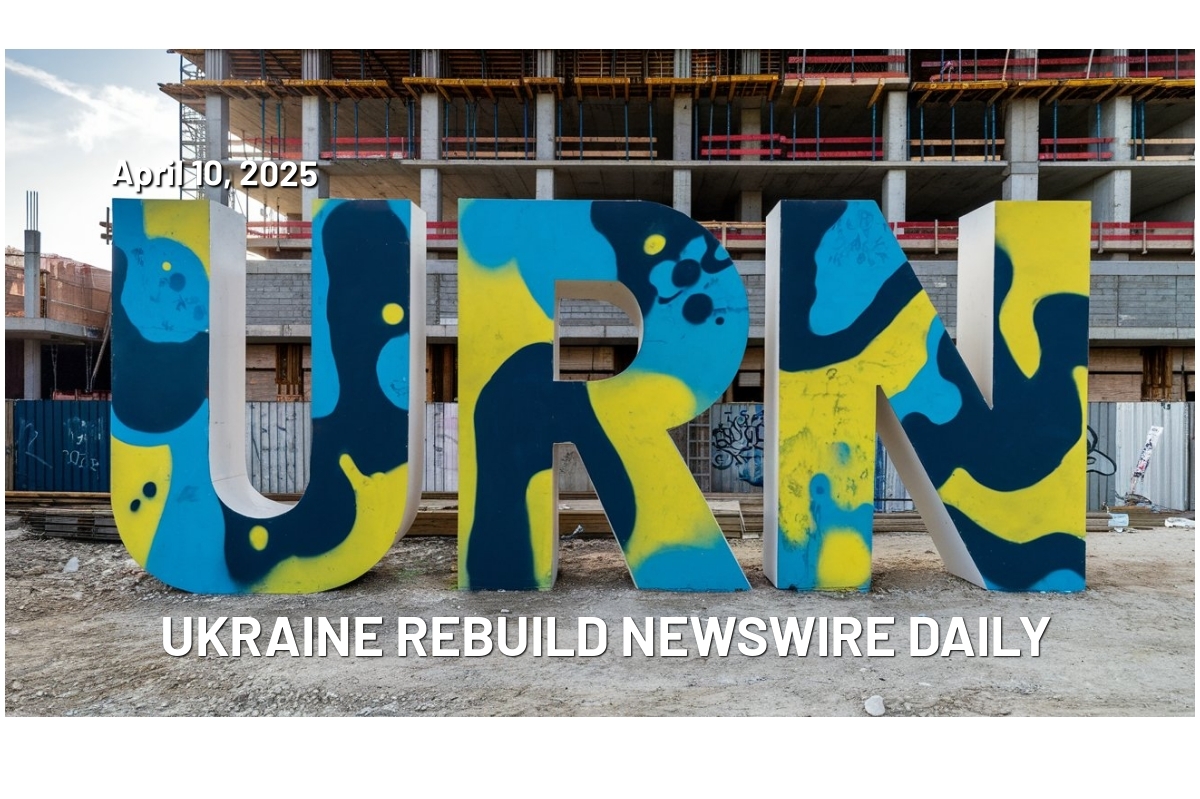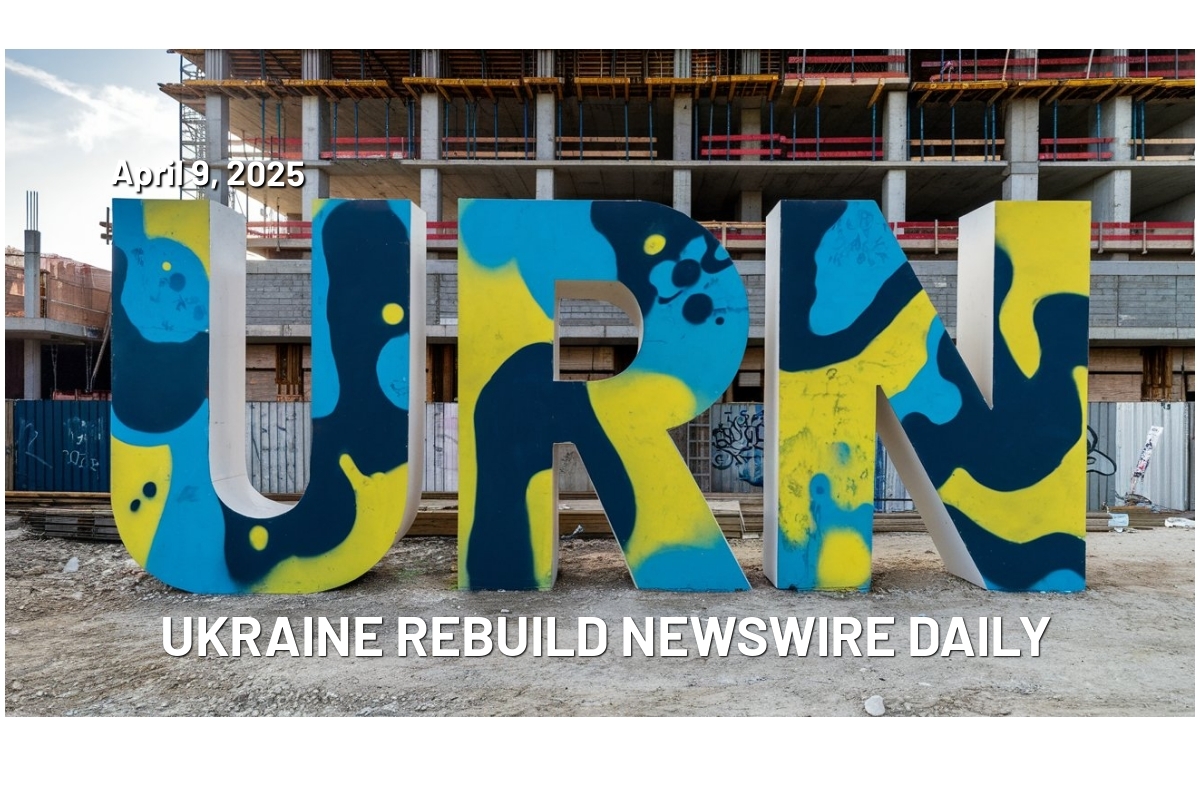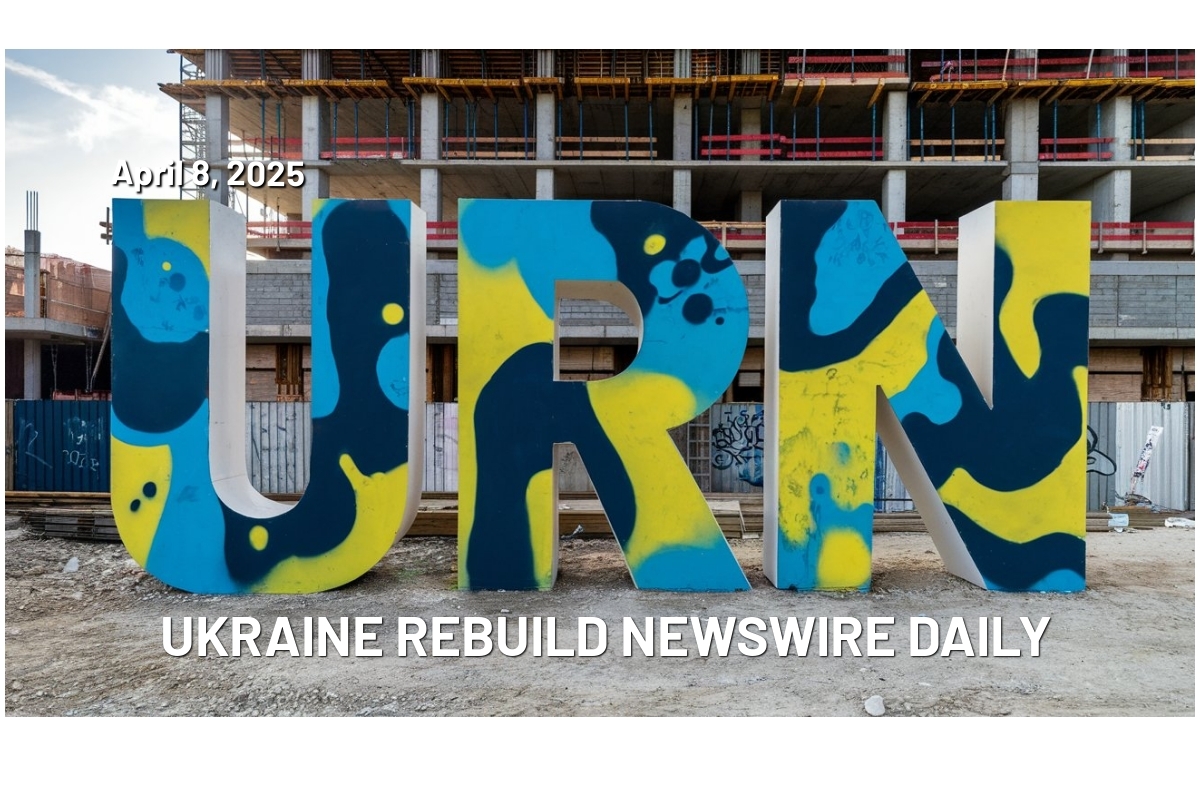Today's Contents
Just The Facts:
- US envoy Witkoff meets Putin in St. Petersburg to discuss Ukraine peace deal
- US demands control of Gazprom gas pipeline through Ukraine under proposed minerals deal, sources say
- Ukraine likely to extend martial law again, says parliamentary speaker
- EBRD extends risk-sharing facility to Raiffeisen Bank Ukraine to support energy investments worth €100 million
- UK and Norway to provide $585 million in military support to Ukraine
Here's What They Think:
- Emerging Europe: Ukraine war turns CEE into frontier of military-tech innovation
- Kyiv Post: International businesses should refrain from re-engaging with Russia
Sober Second Thought:
- Ukrainian universities see drop in admission applications, ZN.UA analysis shows
The Rebuilders' Social
- Ukrhydroenergo meets KfW, Confederation of Builders of Ukraine meets Greek engineering consultancies to talk recosntruction, and DTEK CEO detects growing interest in the US for investing in Ukraine.

Dear Subscribers,
1 - A quick note to say that Ukraine Rebuild Newswire will not publish on Good Friday, April 18, or Easter Monday, April 21, particularly because Catholic and Orthodox Easter coincide this year.
For the remainder of this week, we also expect a slightly slimmer version of URN Daily.
2 - In URN Daily a couple of weeks ago, we promoted a dinner in Kyiv hosted by wandering investor and Friend-of-URN Swen Lorenz.
Swen has now written a review of his trip to Kyiv, which is up on his site at this link. The trip clearly left its mark on Swen.
_____________________________________________________
For questions related to daily news and story suggestions, feel free to message our newsroom chief Valentina Bajic at valentina@ukrainerebuildnews.com.
For sponsorships, the URN Guidebooks, the Tips for Investors column, and other general matters, email founder Adam Brown at adam.brown@ukrainerebuildnews.com.
Now, on to today's headlines …

US envoy Witkoff meets Putin in St. Petersburg to discuss Ukraine peace deal
US President Donald Trump's special envoy Steve Witkoff held a meeting with Russian President Vladimir Putin on Friday in St. Petersburg focused on "aspects of a Ukrainian settlement," the Kremlin said, without offering further detailss
The same day, Trump said in a post on Truth Social: "Russia has to get moving. Too many people are DYING, thousands a week, in a terrible and senseless war - A war that should have never happened, and wouldn't have happened, if I were President!!!"
On Saturday, Trump told reporters on Air Force One that "Ukraine-Russia might be going OK, and you're going to be finding out pretty soon. There's a point at which you just have to either put up or shut up and we'll see what happens, but I think it's going fine."
While in St. Petersburg, Witkoff also met with Putin's investment envoy, Kirill Dmitriev, as seen in photos posted by the Kremlin.
Witkoff and Dmitriev also met in Washington earlier this month amid the White House's push for a ceasefire in Ukraine.
Following that initial meeting, Witkoff told Trump that the quickest path to a ceasefire in Ukraine would be to back a strategy that grants Russia control over the four eastern Ukrainian regions it sought to annex illegally in 2022, Reuters reported on Friday, citing unnamed sources familiar with the matter.
During the meeting with Trump, General Keith Kellogg, the president's envoy for Ukraine, challenged Witkoff's position, stating that while Ukraine might be open to negotiating certain terms regarding contested land, it would never agree to unilaterally surrender full ownership of the territories to Russia, the sources told Reuters.
The meeting reportedly concluded without Trump deciding to alter the US strategy.
US demands control of Gazprom gas pipeline through Ukraine under proposed minerals deal, sources say
The US government demands that the US International Development Finance Corporation (DFC) assume control of a natural gas pipeline from Russian energy major Gazprom through Ukraine to Europe under a proposed minerals deal with Ukraine, an unnamed source familiar with the matter told Reuters.
Officials from the US and Ukraine met on Friday to discuss the US proposal to get access to Ukraine's mineral wealth, the source told Reuters, adding that the chances of a breakthrough were slim due to the meeting's "antagonistic" tone.
"The negotiating environment is very antagonistic," the source said, citing the "maximalist" draft proposal put forward by the Trump administration last month.
The source described the US request for the natural gas pipeline to come under DFC control as one of the "Easter eggs" found in the draft proposal.
Russian gas flows to Europe through Ukraine ceased on Jan 1, after a five-year transit agreement that Ukraine had with Gazprom expired.
The latest minerals deal draft also grants the US preferential access to Ukraine's mineral resources and mandates that all revenue generated from natural resource extraction by Ukrainian state and private companies be deposited into a joint investment fund. The draft reportedly does not provide for any security guarantees for Ukraine.
The Ukrainian government has appointed law firm Hogan Lovells as an outside adviser on the minerals agreement, according to the source who spoke to Reuters.
Ukrainian officials, including President Volodymyr Zelensky, Foreign Minister Andrii Sybiha, and Prime Minister Denys Shmyhal, as well as Deputy Prime Minister Olha Stefanishyna, have been clear that Ukraine will sign no agreement that would hurt the country's path toward EU membership.
Ukraine likely to extend martial law again, says parliamentary speaker
Ukrainian lawmakers are highly likely to extend martial law before it expires on May 9, parliamentary speaker Ruslan Stefanchuk told Reuters in an interview.
Stefanchuk emphasized the practical and legal impossibility of holding free and fair elections in a country partially occupied and continuously under attack.
"It is a priority for me because Ukraine has always been - historically, and it is now, and will remain - a democratic Ukraine. This is what distinguishes us from the Russian Federation. On this issue, we are on two banks of the civilization abyss," Stefanchuk told Reuters.
Stefanchuk also said preparations for future elections have begun, but are in the very early stages.
Since invading Ukraine in 2022, Russia has sought to portray Ukraine's government and especially President Volodymyr Zelensky as illegitimate. The US administration, both under President Joe Biden and President Donald Trump, has also pushed for elections in Ukraine, with Trump even calling Zelensky a "dictator without elections."
Zelensky, whose five-year term ended last year, became president of Ukraine in May 2019. New elections were planned to be held in the spring of 2024.
The elections, however, were not held as Ukraine's law prohibits parliamentary, presidential, and local elections under martial law, which was enforced in Ukraine following Russia's full-scale invasion in February 2022.
Parliamentary approval is needed every 90 days to extend martial law, which permits troop mobilization and the suspension of the electoral cycle.
Stefanchuk told Reuters that the parliament was almost certain to renew its approval because "the war is not over."
EBRD extends risk-sharing facility to Raiffeisen Bank Ukraine to support energy investments worth €100 million
The European Bank for Reconstruction and Development (EBRD) said on Monday it is extending an unfunded portfolio-risk-sharing facility to Raiffeisen Bank Ukraine to enable €100 million worth of energy investments.
Raiffeisen Bank Ukraine joins Ukrgasbank, PrivatBank, and Oschadbank to take part in EBRD's Energy Security Support Facility (ESSF), the EBRD said in a press release.
The EBRD did not disclose the size of the facility, but in an earlier published project disclosure document, it said its funding amounts to €29.2 million.
Under the ESSF, the EBRD will provide a portfolio guarantee to partially cover the risk on a total of €100 million in sub-loans issued by Raiffeisen Bank Ukraine to micro, small, and medium-sized enterprises (MSMEs), as well as eligible corporate and household clients, for the implementation of decentralized energy generation, storage, and energy efficiency projects.
Up to 20% of the total sub-loans will support financing of the long-term capital investments of MSMEs, while residential sub-borrowers will receive up to 2% of the total investments under this project, the EBRD said.
"This is the third portfolio-based risk sharing agreement between Raiffeisen Bank and the EBRD since February 2022. These agreements have enabled us to provide over €220 million in financing to Ukrainian clients, along with up to €2 million in incentives for successfully completed investment projects," said Raiffeisen Bank Ukraine CEO Oleksandr Pysaruk.
Raiffeisen Bank Ukraine is the largest privately owned bank in Ukraine and the fourth largest overall. With an extensive branch network, it serves 2.6 million active clients, providing a full range of traditional banking services to corporate, SME, and retail customers, as per the statement.
UK and Norway to provide $585 million in military support to Ukraine
The UK and Norway will provide a GBP 450 million ($585 million) military aid package to Ukraine, Britain's Ministry of Defense said.
The package includes GBP 350 million from the UK from this year's GBP 4.5 billion military support funding for Ukraine, while the remainder will be provided by Norway, through the UK-led International Fund for Ukraine, the ministry said in a press release on Friday.
The aid covers funding for the repair and upkeep of previously supplied vehicles and equipment, as well as financing for radar systems, anti-tank mines, and hundreds of thousands of drones, as per the statement.
The funding is announced as British Defence Minister John Healey chairs a meeting of the Ukraine Defence Contact Group in Brussels, alongside his German counterpart Boris Pistorius. The group consists of NATO members and other nations supporting Ukraine.
"The work of the Ukraine Defence Contact Group is vital to put Ukraine in the strongest possible position and pile pressure on Putin to help force him to end this terrible war. We cannot jeopardize peace by forgetting the war, which is why today's major package will surge support to Ukraine's frontline fight," Healey said.

Emerging Europe: Ukraine war turns CEE into frontier of military-tech innovation
The war in Ukraine has transformed Central and Eastern Europe into an unexpected frontier of military-tech innovation and economic revitalization, Craig Turp-Balazs, editor of the Emerging Europe, wrote in an op-ed.
Perhaps Ukraine's most significant contribution to the region's transformation is its resilient tech diaspora, Turp-Balazs noted. Millions of Ukrainians fled westward, bringing with them vital technical expertise and entrepreneurial drive, with countries like Poland, Romania, the Czech Republic, and Germany benefiting the most.
Kyiv Post: International businesses should refrain from re-engaging with Russia
International companies should not begin with the revitalization of business ties with Russia, despite the ongoing peace talks and the fact that Ukraine is no longer in the focus of global attention, Mariya Chukhnova, operations manager at US-based think tank The Critical Mass, wrote in an op-ed for the Kyiv Post.
This is the case not only for ethical reasons, but also because Russia is not a safe, stable, or viable environment for commercial activity, Chukhnova wrote, pointing to the absence of the rule of law, systemic corruption, and reputational damage.

Ukrainian universities see drop in admission applications, ZN.UA analysis shows
The number of people applying to Ukrainian universities has started to decline, dropping to 202,000 in 2024 from 230,700 in the pre-war 2021, an analysis conducted by Ukrainian newspaper Dzerkalo Tyzhnia (ZN.UA) shows.
According to data from Ukraine's Education Ministry provided in response to a ZN.UA inquiry, 54,300 applicants over the age of 25 applied for bachelor's degree programs in 2023—but in 2024, that number plummeted to just around 4,000.
The apparent surge in applications of individuals over 25 in 2023 was reportedly largely fueled by those seeking to use student status as a means to avoid mobilization. However, legislative changes in 2024 closed this loophole, leading to a direct drop in applicant numbers, ZN.UA noted.

At a recent meeting with educators in Lviv, Deputy Education Minister Nadiia Kuzmychova stated that approximately 2.1 million Ukrainian school-aged children are currently living abroad. Of these, only 358,000 are "visible" within Ukraine's education system, according to ministry data. Among them, just 25,000 are graduating students, the ministry reported in response to a ZN.UA inquiry.
According to Ukraine's Ombudsman Dmytro Lubinets' Special Report on access to education for children and youth from Russian-occupied territories, an estimated 600,000 Ukrainian school-aged children may currently be living under Russian occupation. As of October 2024, only 44,000 of them remained enrolled in Ukraine's education system.

In addition, an increasing number of senior students are opting not to apply to Ukrainian universities in the year immediately following graduation, according to the analysis. This trend is reflected in the declining percentage of high school graduates participating in the university admission process: in the pre-war year of 2021, nearly 70% applied, while in 2024, just over half chose to do so.

While foreign countries have long attracted Ukrainian graduates, the number of opportunities to study abroad has grown significantly since Russia's full-scale invasion - many international universities now offer dedicated social support programs and scholarships for Ukrainian students, while high school seniors living abroad often have even greater access to higher education, as they integrate into local education systems, ZN.UA reported.
Also, the number of senior students - who are potential university applicants - begins to decrease even before graduation. A clear example of this decline can be seen in the current senior class. In their penultimate year (2023/2024), there were 243,000 students, but by their senior year (2024/2025) in September, 234,000 seniors were enrolled in school, according to data compiled by ZN.UA.

When it comes to the upcoming admission campaign, it's worth considering what lies ahead in the long term, for example, a dozen years from now, when today's first-graders reach their senior year, ZN.UA noted.
The number of first-graders is shrinking each year. From the pre-war 2020/2021 school year to the current 2024/2025 school year, their numbers have dropped by 142,000. Prestigious schools in the capital, once known for their highly competitive entrance processes and reliance on personal connections, are now reducing the number of first-grade classes and will gladly accept all applicants. Some schools are even uncertain whether they will be able to enrol first-graders at all, as per the analysis.


Social Media Posts
Ukrhydroenergo Discusses Projects with KfW
Ukrainian hydropower producer Ukrhydroenergo said a delgation from the company met with representatives of German development finance institution KfW in Brussels "to explore potential partnerships in the restoration and modernization of Ukraine’s energy infrastructure."
"Discussions focused on the reconstruction of hydropower plants, strengthening the protection of critical infrastructure, and the deployment of hybrid systems and energy storage technologies," the company wrote.
CBU Meets Greek Consultancies on Reconstruction
The Confederation of Builders of Ukraine recapped a meeting with Hellenic Engineering & Construction, a Greek consultancy specialized in project development and planning and Greece's LDK Consultants, which focuses on hotels, multifunctional buildings, hospitals, and infrastructure.
During the meeting, the parties discussed potential areas of cooperation in sustainable urban development, energy-efficient construction, infrastructure modernization, as well as the possibility of implementing joint reconstruction projects in Ukraine.
Growing Interest in US?
Maxim Timchenko, CEO of DTEK, the largest private investor in Ukrainian energy, recapped a trip to the US in which he said he detected a "growing interest in what Ukraine has to offer.?
"By combining US capital and technical know-how with the local experience and understanding of companies like DTEK, the United States and Ukraine have the foundations of an exciting energy partnership."

URN Daily: Sense Bank and Ukrgasbank for sale? And US seeks to cancel $4.7 billion of Ukraine's debt

